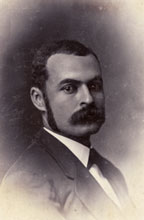 |
| D. C. Griffing From Dartmouth Library |
Douglas Carr Griffing (b. January 4, 1845; d. July 10, 1925)
Education: Oberlin College (no degree), Dartmouth (A.B.?), Harvard University (no degree)
Occupation: dealer in boots and shoes,
Douglas C. Griffing (often misspelled "Griffin" or "Griffen") was born in Rodney, Mississippi in 1845 to Henrietta Griffing and an unknown father. Henrietta described herself as widowed in the 1880 census. Little is known about Douglas's early life. Douglas described his father as being born in Massachusetts in the 1880 census, Ireland in 1900, and Wales in 1920. The information provided by Douglas is almost certainly false. At the time, he was passing as white, so he had good reason to conceal his birthplace. Other information he provided to census takers is verifiably false. He described his mother as being born in Massachusetts in 1880 and 1900 and in Tennessee in 1920, but she described herself as being born in either Virginia or Tennessee (records are contradictory). One possible explanation for the confusion surrounding Douglas's parentage is that his father was his enslaver.
Douglas first appears in records as a student at Oberlin College. He completed the preparatory school and several years of college. He then moved to Dartmouth College in 1872 and graduated with an A.B. degree the next year. Afterwards, he pursued legal studies at Harvard University, but he left after a year without completing a degree. Instead, he returned to the town of Oberlin and served as an agent for the New National Era newspaper (a Republican newspaper founded by Frederick Douglass).
In July 1874, Douglas was elected professor at Alcorn University. This was a chaotic time for the school, and it is unclear if he did any significant teaching. In October, disorder broke out on the Alcorn campus because of conflict between students, faculty, and administrators. The trustees requested the resignations of all professors, and three professors (not named) immediately resigned. By March, Douglas was removed from his position as the state legislature declared all professorships vacant.
Douglas remained in the region after his professorship was declared vacant and was active in Republican politics. At an April 1876 colored State Convention, he was appointed as one of the delegates to a convention in Nashville. Records of the Alpha Delta Phi states that he was a state senator in 1876, but this appears to be an error as he does not appear in a photograph of that year's state senators.
By 1878. Douglas had left Mississippi. That year he moved to Kansas and worked as a land agent. Later, he had moved to Kearney, Nebraska and was working as a "dealer" in boots and shoes. Around this time, he began calling himself "D. C. Griffin" and claiming to be a white man from Massachusetts.
Douglas moved to Jamestown, North Dakota in 1892. He remained there until he retired. He was living in Chicago, Illinois around 1899, but he eventually settled in the town of Redlands, California. He remained there until his death in 1925.
Sources
1. "Agents for the New National Era." New national era. [volume], October 01, 1874, Image 4



No comments:
Post a Comment